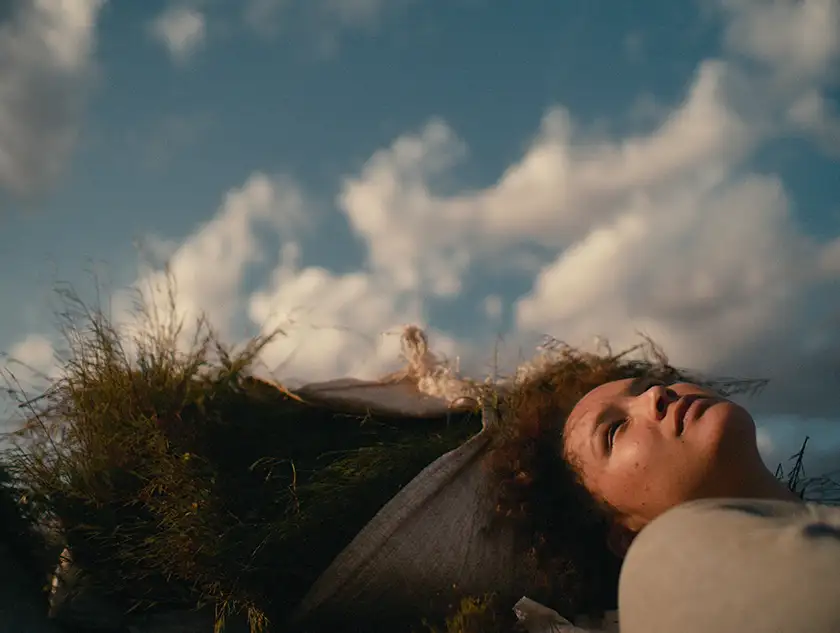Devon Delmar and Jason Jacobs’ stunning Carissa is a poignant look at purpose, place and reconciling circumstance.
Directors: Devon Delmar & Jason Jacobs
Genre: Drama
Run Time: 89′
Venice World Premiere: September 5, 2024
U.S. Release Date: TBA
U.K. Release Date: TBA
The joy of independent cinema is finding a film that connects with its audience on an emotional level. Carissa, from writer/director duo Devon Delmar and Jason Jacobs, is one such gem, a film that eschews what could have been a more traditional ‘movie’ narrative and aims for something much more intimate and poignant. It’s a film about embracing both change and a lack thereof, and about discovering purpose and solace in both ourselves and our surroundings. It’s stunning, thematically and visually, and authentically embraces the place and the people it centres.
Carissa (Gretchen Ramsden) feels a little adrift, living with her elderly Grandmother (Wilhelmiena Hesselman) in Wupperthal, a rural mountainside village in South Africa. A luxury golf estate is being developed nearby, and Carissa is encouraged to apply, as it presents an opportunity for education and training in the city. But when Carissa’s drinking and troublemaking leads to an argument with her Grandmother, she runs away, finding refuge in the mountains with her estranged Grandfather (Hendrick Kriel) on his rooibos tea farm.
There’s an inherent peacefulness to Carissa. It’s a film that establishes its setting almost immediately, relishing in the simplicity of Wupperthal and allowing for its natural beauty and tranquillity to emphasise the way of life embraced by its community. For it’s a very specific one, and the crux of Carissa’s conflict in the film is in trying to establish her own place in and out of it. When we first meet her, she seems almost uninterested and unenthused about the things those around her are interested and enthused about. She’s noncommittal about signing up with the golf estate, much more keen on enjoying a drink and a smoke in the local bar with her friend Gladwin (Gladwin van Niekerk).
But then she heads up into the mountains, admittedly not entirely at her own behest, and it stirs a significant change in her. She comes to thrive in the work and the small community on her Grandfather’s tea farm. A calmness settles over her. Carissa’s journey throughout the film is mostly internal, and she doesn’t express herself much verbally, but Ramsden’s performance is so full of feeling that she really doesn’t ever need to. It’s an impressive and effective encapsulation of the turmoil of being but not belonging yet.

Delmar and Jacobs keep the focus of Carissa fully on its protagonist, emphasising her internal journey as the main narrative drive of the film. A more ‘Hollywood’ version of this film might have placed the golf estate in the role of the villain, especially considering the ramifications it has for the tea farm. But, in reality, these projects are less about ‘underdog vs conglomerate’ or ‘rural vs urban’ as they are about opportunity, money and change for these small communities. It’s much more complex than black or white and good or bad. And, ultimately, it feels like the best course of action for Delmar and Jacobs, to eschew that narrative thread and keep it centred around Carissa, for her journey is much more meaningful.
The change in Carissa is almost meditative – which is a feeling that’s prevalent throughout the entire film – and is the result of finding and embracing purpose, even if it’s in circumstances that are not necessarily the ones we’d prefer or have chosen. For the end of the film finds Carissa back to where we first found her, and yet she feels like a new person. There’s a maturity and a knowingness to her that was missing before, and while she’s still recognisable as herself, she feels more settled.
Carissa’s journey leads her to embrace the path that she finds herself treading, escaping a pattern of cyclical behaviour, and ultimately understanding that staying still is not necessarily the doomed equivalent of flying away. It feels like that is Delmar and Jacob’s intention with the film, beautifully realised, visualised from cinematographer Gray Kotzé, and communicated via its intimate script and sensitive direction.
Carissa is a seemingly unassuming film that actually has so much to say. One line in particular – “the mountains are wide open for you” – is incredibly poignant and healing, embracing the idea that while remaining at home is the right place for Carissa currently, that might not always be the case. Delmar and Jacobs have crafted something so intimate and peaceful, crammed full of beauty and meaning, that it feels like an exercise in introspection to watch it. It’s a truly impressive debut feature, and definitely one that leaves a lasting impression.
Carissa had its World Premiere at the Venice Film Festival on September 5, 2024. Read our review of Dea Kulubmegashvili’s April!

